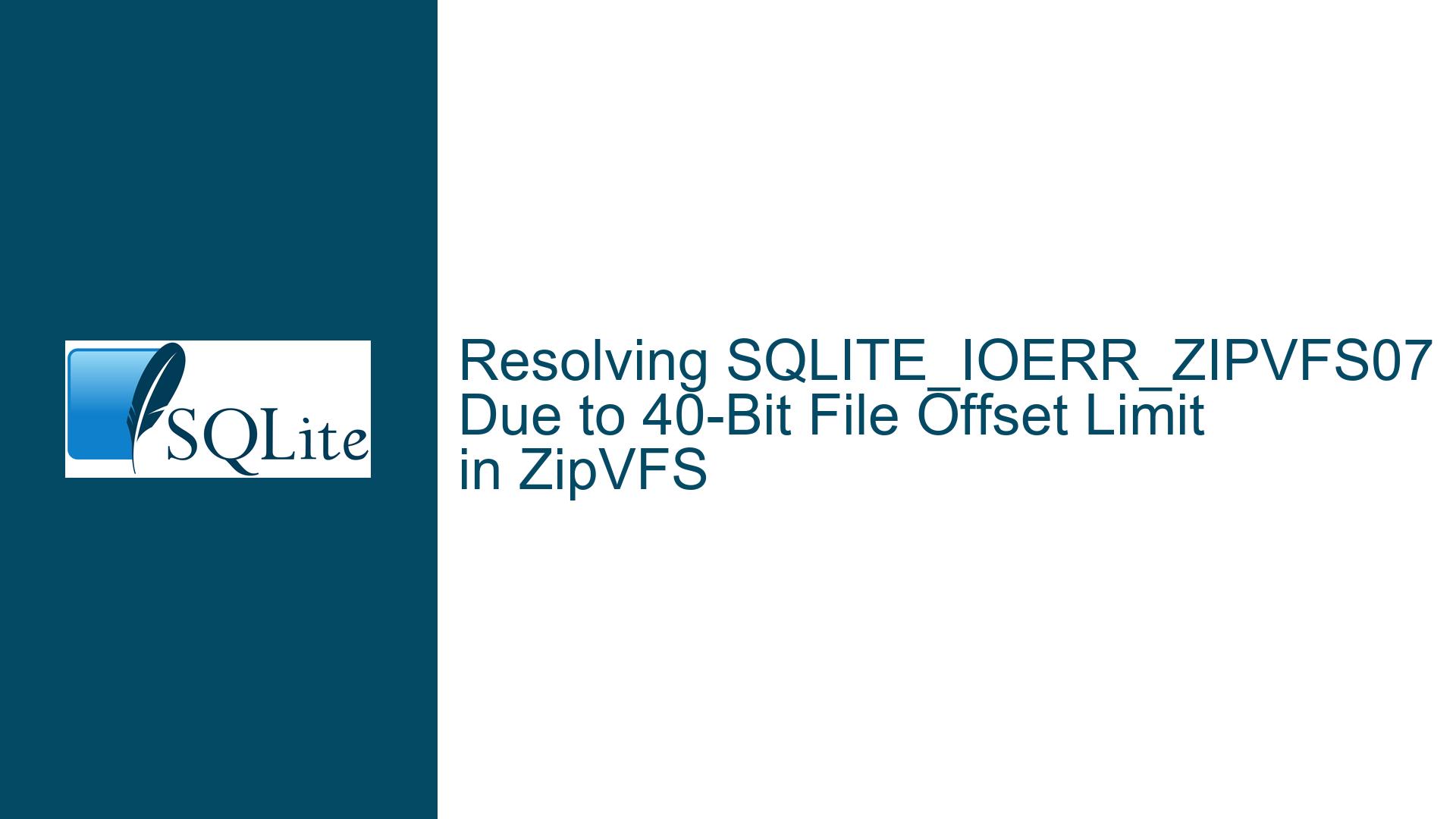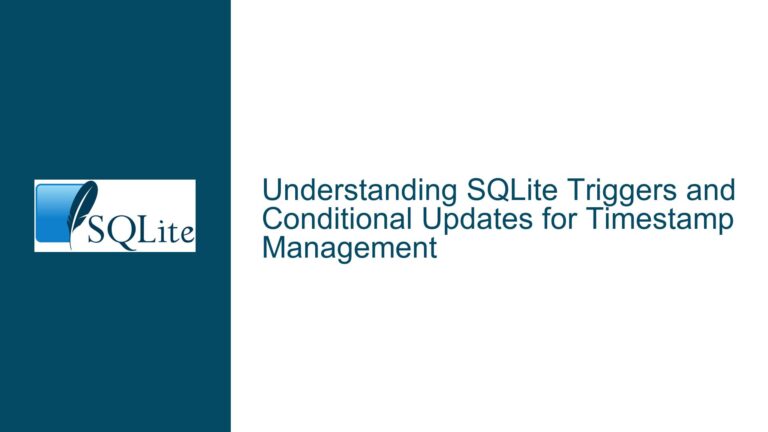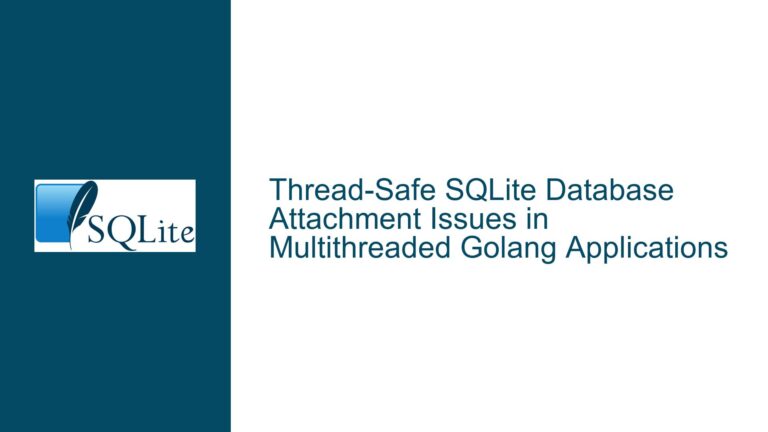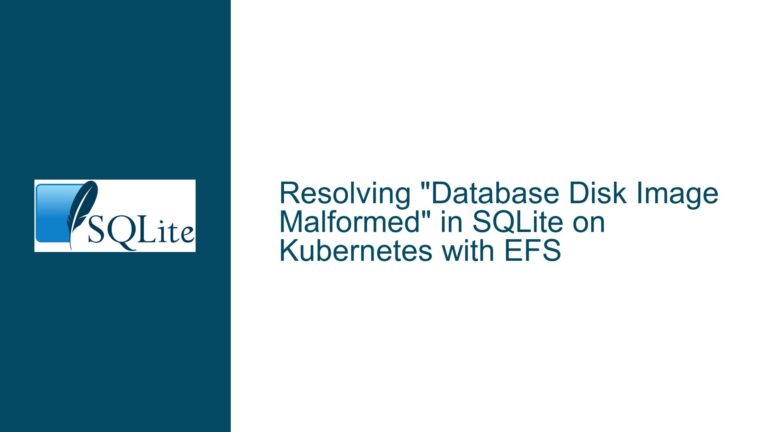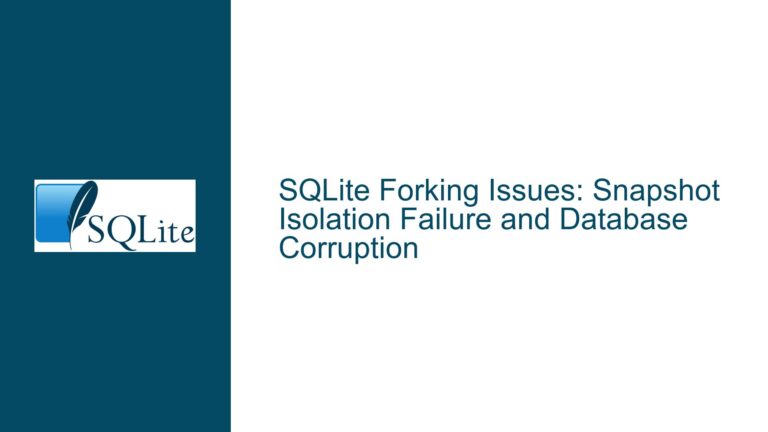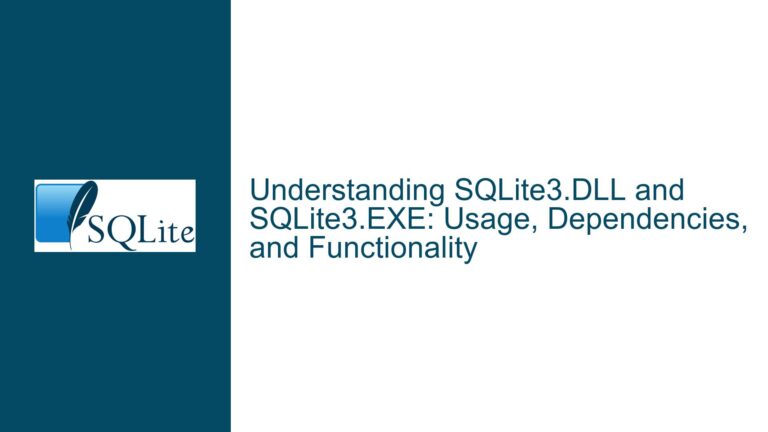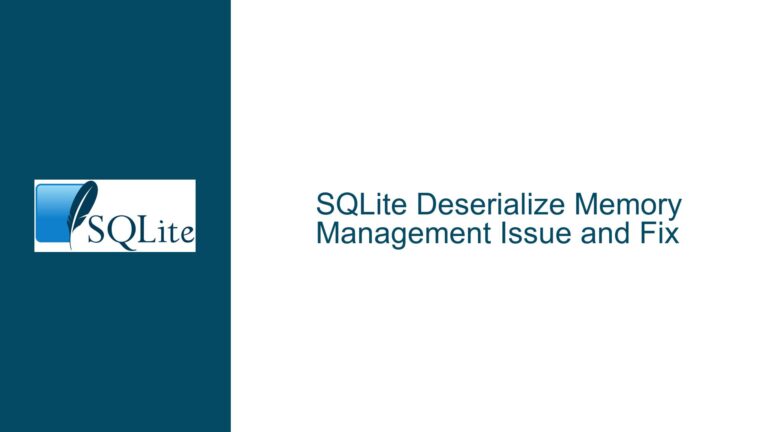Resolving SQLITE_IOERR_ZIPVFS07 Due to 40-Bit File Offset Limit in ZipVFS
Understanding the SQLITE_IOERR_ZIPVFS07 Error During Index Creation
Issue Overview: Extended Error Codes and ZipVFS Limitations
The SQLITE_IOERR_ZIPVFS07 error (hex code 0x219070A) arises when creating an index in a SQLite database configured with the ZipVFS extension, particularly when the database exceeds the 40-bit file offset limit imposed by ZipVFS. This error manifests as a decompression failure (e.g., ZSTD errors) due to corrupted page map entries caused by truncated file offsets. The error code structure combines a base SQLITE_IOERR (0x070A) with extended information (0x219) specific to the ZipVFS implementation.
ZipVFS, a virtual file system extension for SQLite, compresses database pages and stores variable-length blocks. Its on-disk format allocates 40 bits for file offsets in page map entries. When a database grows beyond 1 terabyte (the maximum addressable size with 40 bits), the 64-bit file offsets generated by the OS are truncated to 40 bits during write operations. This truncation corrupts the page map, causing subsequent read operations to retrieve invalid data. Decompression of these invalid blocks fails, triggering the SQLITE_IOERR_ZIPVFS07 error.
The error is exacerbated by the absence of runtime checks in ZipVFS for offset overflow. Instead of returning SQLITE_FULL when offsets exceed 40 bits, ZipVFS silently writes invalid offsets, leading to undetected database corruption. This issue is distinct from standard SQLITE_FULL errors, which occur when the database file itself exceeds storage limits. Here, the corruption stems from ZipVFS’s internal limitations.
Root Causes: ZipVFS Design Constraints and Silent Truncation
40-Bit File Offset Limitation:
ZipVFS encodes file offsets in page map entries using 5 bytes (40 bits), limiting databases to 1 terabyte (2^40 bytes). Modern systems use 64-bit file offsets, and databases exceeding this threshold cause silent truncation.Lack of Overflow Checks:
The ZipVFS code does not validate whether file offsets fit within 40 bits during write operations. This omission allows truncated values to corrupt the page map, rendering subsequent reads unreliable.Decompression Failures:
Truncated offsets point to incorrect locations in the database file. When ZipVFS attempts to read and decompress these blocks, it retrieves arbitrary or invalid data, leading to ZSTD (or other compression algorithm) errors.Cross-Platform Variability:
The error may manifest inconsistently across platforms due to differences in file system behavior, compression libraries, or SQLCipher configurations. For example, macOS/aarch64 systems might handle large file offsets differently than Linux/x86_64 systems.Interaction with SQLCipher:
The use of SQLCipher (an encryption layer) complicates debugging. Encryption can mask underlying data corruption, making it harder to trace the error to ZipVFS.
Diagnosis, Workarounds, and Long-Term Solutions
Step 1: Confirm Database Size and ZipVFS Configuration
Check Current Database Size:
ExecutePRAGMA page_count;andPRAGMA page_size;to calculate the database size:SELECT page_count * page_size FROM pragma_page_count(), pragma_page_size();If the result exceeds 1 terabyte (1099511627776 bytes), ZipVFS is likely truncating offsets.
Review ZipVFS Version:
Older ZipVFS versions lack explicit checks for 40-bit overflow. Verify the version and update to the latest codebase if possible.
Step 2: Implement Immediate Workarounds
Set
max_page_count:
UsePRAGMA schema.max_page_count = N;to cap the database size below the 40-bit threshold. CalculateNas:PRAGMA max_page_count = (1099511627776 / page_size);Replace
page_sizewith the value fromPRAGMA page_size.Monitor Database Growth:
Implement application-level checks to prevent writes that would exceed the limit. For example, trigger warnings when the database reaches 90% of the 1TB limit.
Step 3: Patch ZipVFS to Enforce 40-Bit Limits
Modify the ZipVFS source code to validate file offsets before writing page map entries:
// In zipvfs_file.c (or equivalent), add:
if (offset > (sqlite3_int64)0xFFFFFFFFFF) {
return SQLITE_FULL;
}
Recompile SQLite/SQLCipher with this patch to convert silent truncation into an explicit SQLITE_FULL error.
Step 4: Migrate to a 64-Bit Page Map Format
For databases requiring >1TB, extend ZipVFS to support 64-bit offsets:
- Redesign the page map entry structure to use 8 bytes for offsets.
- Update read/write routines to handle 64-bit values.
- Ensure backward compatibility by versioning the database format.
Step 5: Debug Decompression Failures
Extract Corrupted Pages:
Usesqlite3_blobor custom tools to read raw page data from the database file. Compare the retrieved data with expected compressed blocks.Enable ZipVFS Debug Logging:
Recompile ZipVFS with logging enabled to trace page reads and decompression attempts:#define ZIPVFS_DEBUG 1
Step 6: Validate Across Platforms
Test the patched ZipVFS on all target platforms (e.g., RHEL 7/x86_64, macOS/aarch64) to ensure consistent handling of large offsets.
Long-Term Best Practices
Adopt a Hybrid Storage Model:
For databases exceeding 1TB, split data into multiple ZipVFS-backed databases or offload older data to a non-compressed SQLite instance.Implement Checksums:
Add application-level checksums to detect corruption early. For example, store a hash of critical compressed pages and validate them during reads.Monitor File System Fragmentation:
Large databases stored on fragmented file systems may exacerbate offset miscalculations. Use defragmentation tools or preallocate contiguous space.
By addressing the 40-bit limitation through runtime checks, configuration tweaks, and format upgrades, developers can mitigate SQLITE_IOERR_ZIPVFS07 errors while maintaining compatibility with existing SQLite tooling.
